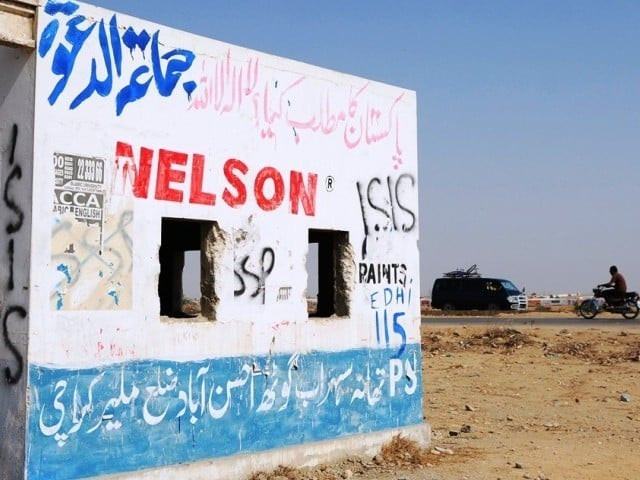Darkness risen
Unlike other terrorist organisations, the IS has a proven capacity to take and then hold and administer large areas

There has been IS leafleting and wall-chalking, principally in Khyber-Pakhtunkhwa, but in other provinces as well, which is indicative of an IS latency even if it is not fully operational as yet. PHOTO: AFP

Typically, terrorism is successful in places where governance is weak or absent, and Pakistan has no shortage of areas where the government writ does not run at all. In these ungoverned spaces, the seeds of the IS have been sown. Prime Minister Nawaz Sharif, commenting on the attack, said that terrorism was an enemy common to both Afghanistan and Pakistan and we do not disagree with him; it is. Equally held in common is the inability of either national government to successfully eradicate terrorism, or subvert the mindset that allows terrorism to become embedded in the first place. In Pakistan, there has been considerable military success in fighting terror, but the hearts-and-minds campaign that needed to be waged alongside the military has never come together at a national level, and is only patchily being addressed provincially — and that too, with no coordinated uniformity.
The IS has not formally announced its presence in Afghanistan, and its presence here has been repeatedly denied for months by Pakistan government representatives. There has been IS leafleting and wall-chalking, principally in Khyber-Pakhtunkhwa, but in other provinces as well, which is indicative of an IS latency even if it is not fully operational as yet. As evidenced on innumerable occasions in places where the IS has penetrated in the last year, it is rich, highly organised, well armed, trained and has the capacity not just to commit acts of terror, but crucially, to govern as well. Unlike other terrorist organisations, the IS has a proven capacity to take and then hold and administer large areas. In short, the IS delivers in some places on its promise to create what it calls the caliphate, and that should give our government cause for grave concern.
This is not to suggest that the IS is about to take over parts of Pakistan as suddenly as it did in Iraq. That is most unlikely in the foreseeable future but what is more likely — indeed may well have already happened — is that the IS will establish an operational capacity in Pakistan. The churn inside the Tehreek-e-Taliban Pakistan has already produced expressions of allegiance to the IS by groups known to be well armed and experienced in asymmetric warfare. There is disaffection within the Taliban ranks about the lack of visibility of their putative leader Mullah Omar, who has not been seen or heard of since 2001. For that disaffection to translate into IS support operationally would be dark news indeed.
A further area of concern is the safety or otherwise of foreign nationals living and working in Pakistan. The unsuccessful attempt to kill an American academic in Karachi was claimed by a group said to be affiliated to the IS. On that basis, no foreigner living and working in an unsecured environment can be regarded as safe. Something wicked has this way come, and it found all the doors helpfully unlocked.
Published in The Express Tribune, April 21st, 2015.
Like Opinion & Editorial on Facebook, follow @ETOpEd on Twitter to receive all updates on all our daily pieces.















COMMENTS
Comments are moderated and generally will be posted if they are on-topic and not abusive.
For more information, please see our Comments FAQ